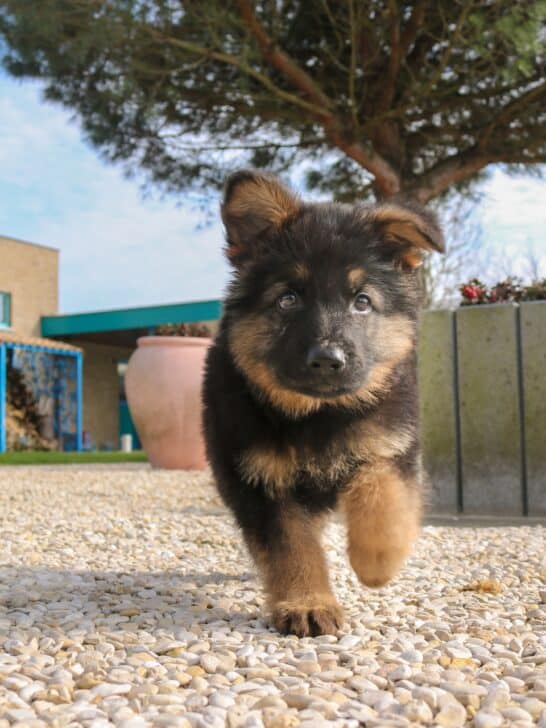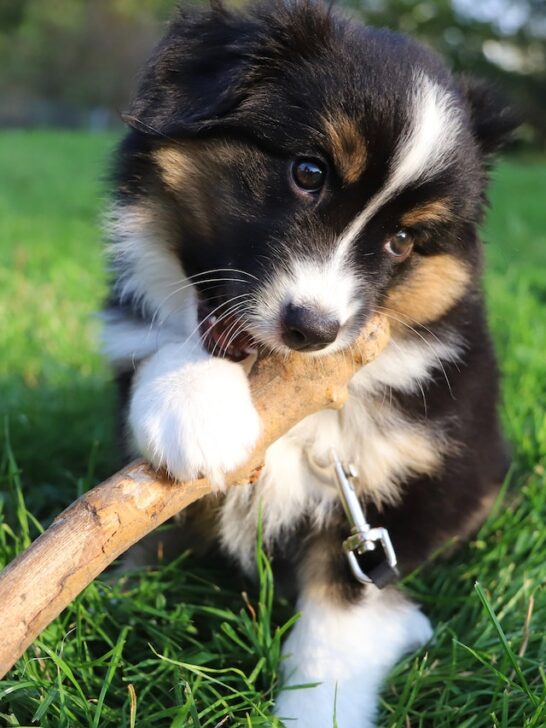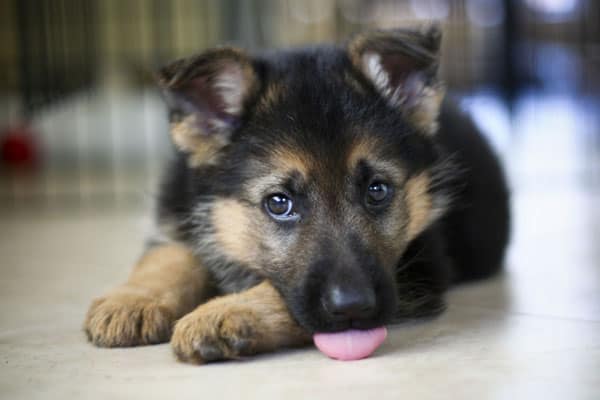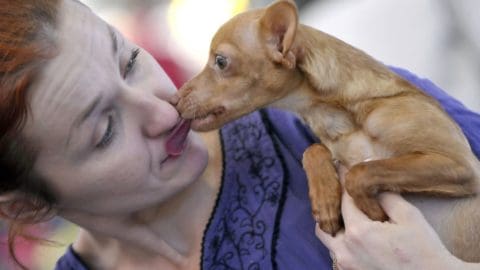Why Does My German Shepherd Grunt: Understanding GSDs Sounds
Dogs and people have lived side by side for many thousands of years. However, dogs still can’t talk in “people” language. And dog owners still can’t talk to their dogs in “canine.”
This can make for more than a little confusion as you and your German Shepherd get to know each other!
This is especially the case for German Shepherds, as the GSD is known to be a more vocal dog breed. German Shepherd owners are often confused about why their puppy dog is grunting, groaning, or moaning and concerned something is wrong.
In this article, we take an in-depth look at why your German Shepherd may grunt, what these sounds can mean, and how to interpret them to make sure your dog is happy and healthy.
No one who owns a GSD seems unfamiliar with the grunts, groans, whining, whimpering, barking, and crying that German Shepherds do so readily.
Why Does My German Shepherd Grunt? German Shepherds are vocal dogs, but if your German Shepherd does a lot of grunting (versus a lot of whining or crying), it may be that is the sound that seems to get your attention the fastest.
However, different dogs may use different sounds depending on which sounds you respond most to.
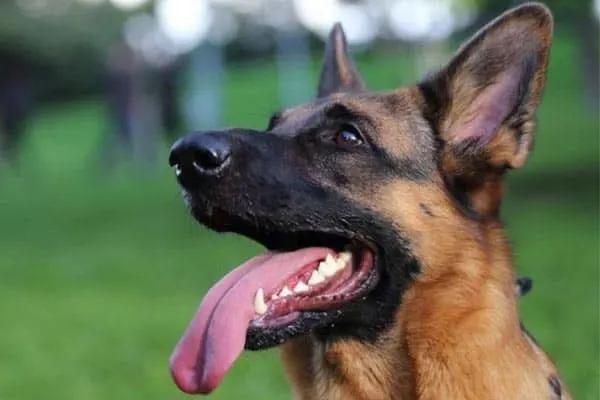
Listen to a German Shepherd Vocalizing
As this short GSD owner’s YouTube video showcases, the German Shepherd dog has a wide range of sounds, and these dogs are not afraid to use them!
You can also watch the German Shepherd start vocalizing when something the dog wants – his owner’s attention and patting – stops happening. The moment the dog gets more pats, the noises stop.
In this even shorter GSD owner-made video, you can hear a German Shepherd grunting while the owner gives the dog pats. So some GSDs may grunt when something they want goes away while others may grunt when something they want is offered.
What Does It Mean When a German Shepherd Grunts?
As VetStreet points out, German Shepherds are so “talkative” in terms of the range of sounds they make and the frequency with which they make them that they make the top 12 most talkative dogs list!
A brief history of the German Shepherd dog breed
The German Shepherd got their start under the careful guidance of a German cavalry officer named Max von Stephanitz. Captain von Stephanitz set out to create what he termed the “perfect” working dog.
He started with a dog that many GSD breeders now believe was a wolf-dog hybrid.
As the German Shepherd Rescue Elite charity explains, the goal was to breed a dog with certain consistent traits that included loyalty and intelligence.
If in fact that original dog was a wolf-dog hybrid as so many GSD experts now suspect, then using vocalizations as a communication tool would be very much in alignment with how wild wolves “talk” to each other.
How wild wolves use sounds to communicate
As the International Wolf Center explains, sounds are one of the three primary communication methods wolves use to stay in touch over long distances.
The other two methods are marking (scent) and body language.
Wolves are famous for their haunting howls, of course, but they are equally as likely to whimper, growl, grunt, moan or cry – or even bark – to make their message clear.
Based on what the International Wolf Center shares about common sounds, the howl is probably the closest sound to the grunt that most German Shepherd dogs make. The howl can be used for both defensive and social purposes.
In the same way, as you saw in the two videos you watched here earlier, the German Shepherds appeared to be using their vocalizations for social and bonding purposes, and specifically to tell their people what they wanted.
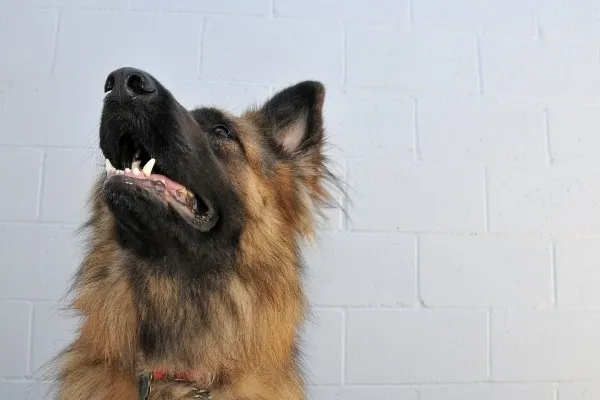
When a German Shepherd Grunting Sound Might Be Health Related
It is always important to pay close attention to your German Shepherd’s vocalizations, because any time your GSD makes sounds, there is always a message attached to those sounds.
As so many German Shepherd owners describe, sometimes it can seem like there is no particular message other than that of social bonding.
But even that is a powerful message – and as you just learned in the previous section here, it is a tool wild wolves use daily to stay in touch with their packs.
Sometimes, a German Shepherd that grunts may be doing so due to health issues. As the Mid-Atlantic German Shepherd Rescue organization explains, GSDs are prone to certain genetic health issues.
Some of these health issues can cause quite a bit of pain and even become quickly life-threatening.
However, because the German Shepherd dog breed is so vocal ordinarily, you may have to look further to discover whether your dog is grunting just to stay in touch or because they may be uncomfortable or in pain.
Here are some of the most common heritable (genetic) health issues that tend to happen more frequently in the German Shepherd dog breed that might cause your dog to grunt with discomfort or pain.
Joint problems
German Shepherds can inherit hip or elbow dysplasia. Both conditions result from a ball socket joint that does not develop the way it should. While dysplasia is present from birth, you may not see any signs of it until your GSD puppy starts to grow bigger.
The malformation of the ball socket can cause a lot of pain because there is no cushion as your dog moves, so bone grinds against bone.
If your dog seems to be struggling with lameness, stiffness, weakness in one or more joints, or pain, it is smart to take your dog to the veterinarian for an exam.
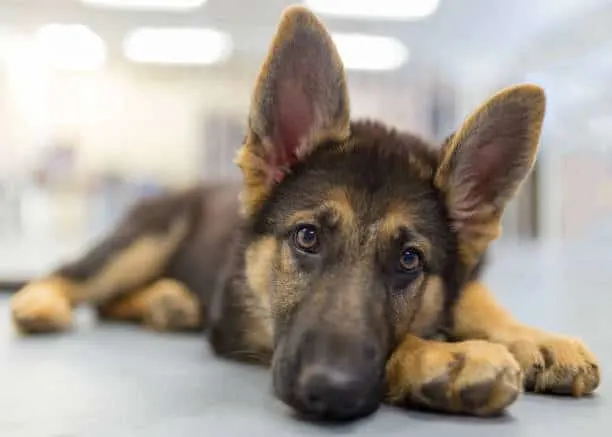
Degenerative myelopathy
Degenerative myelopathy is a neurological condition that can occur more commonly in German Shepherd dogs.
This condition is thought to be genetic but researchers are still not sure exactly what causes it or how it passed along. Degenerative myelopathy causes a gradual disintegration of the spinal column.
This condition cannot be reversed and the only treatment is comfort-related. Senior GSDs are more commonly affected.
Bloat (gastric dilatation-volvulus)
Bloat is a life-threatening condition that is more common in large breed dogs with deep chest cavities such as the German Shepherd.
Bloat most frequently occurs when a period of intense exercise or activity is quickly followed by drinking a large volume of water or eating a big meal.
Researchers still are not sure why it happens or how, but the stomach will suddenly twist and cut off circulation in and out of the stomach area. This condition can turn deadly fast and even prompt treatment may not save a dog.
Luckily, there is a simple surgery you can ask your veterinarian to do that will prevent your dog from ever having bloat. If you haven’t had your GSD fixed (spayed or neutered) yet, you can ask to have the bloat prevention surgery done at the same time.
Growing pains (panosteitis)
Panosteitis is a word that essentially translates to mean “wandering lameness.” It happens when your dog is growing rapidly from puppyhood into an adult dog.
The condition is said to “wander” because it can cause sudden lameness in one or more joints that come and goes.
The condition is nicknamed “growing pains” because the vast majority of afflicted dogs simply seem to grow out of it.
Perianal fistulas
Fistulas is a word that means “sores.” These sores form around the German Shepherd’s anal sacs and cause a lot of pain and inflammation.
Researchers are not sure why GSDs seem more prone to this condition or even why it happens. Some researchers think it is kind of like a Crohn’s disease for dogs – a malfunction in your dog’s immune system.
Allergies
German Shepherds are also more prone to developing allergies. Skin allergies and food allergies are common complaints among GSD owners.
German Shepherds are also known to be more susceptible to a sensitive stomach and may require a special limited ingredient diet to be able to digest their food well.
Skin allergies can cause rashes, redness, inflammation, infection, and pain. These dogs have such thick coats that sometimes the infection can take root near the skin and won’t be noticed until it gets painful.
Why Do German Shepherds Have So Many Health Issues?
While the list you just read of possible German Shepherd health issues may seem overwhelming, many of the conditions on the list affect lots of different dog breeds, not just the GSD.
But there is also some evidence that the German Shepherd dog show breed lines have become more genetically limited due to breeding for a certain appearance.
Sometimes this can cause an increase in inheritable or genetic health issues that may get passed along with other more desirable traits, such as a sloping back or a certain coat color pattern.
For this reason, it is important to choose the breeder you buy your GSD puppy from carefully. Ethical and responsible German Shepherd breeders will make sure to test their parent dogs for genetic issues so the puppies will be healthier.

How to Tell If German Shepherd Grunting Is Health Related
Earlier here you learned that German Shepherds, like wild wolves, tend to be more vocal for multiple reasons.
From defending their home and young to keeping in touch with pack members over long distances, it would seem German Shepherds have inherited the same tendency to use sound to send messages back and forth.
But how can you tell when the grunting your GSD is doing may be sending you the message that your dog is in pain or is uncomfortable and needs your help?
The best way to decipher what your dog may be trying to tell you is to watch for other clues in addition to the grunting sounds.
For example, when does your German Shepherd grunt? Is it only when you are patting them (or not patting them)? Or is it when your GSD tries to get up and walk or sit down and get comfortable?
If you notice grunting sounds when your dog is trying to relieve themselves or run or play or just after a big meal or big drink of water, there may be a health reason at the root of it.
For first-time German Shepherd dog owners, in particular, it can take some time to learn what sounds your dog uses to send you certain messages.
Over time and as you share daily life together, you will get a lot better at figuring out whether your dog is grunting with pleasure or with pain, with a request or because they are in distress.
Other Reasons Your German Shepherd Might Grunt
There are some other important reasons you should know about that might cause your GSD to grunt.
- Your dog is bored and wants exercise or playtime or your attention.
- Your dog is feeling protective or territorial of food or toys.
- Your dog is having issues with another family pet (such as another dog or a cat).
- Your dog is afraid, such as during a thunderstorm or fireworks display.
- Your dog is jealous and is trying to get your attention away from another pet or family member.
It is important to remember that German Shepherds are dogs that become intensely bonded with “their” people. These are not dogs you can leave in the backyard alone or even with another dog to play with.
German Shepherds are only happy when they are living side by side with their human families and getting a lot of love, affection, attention, and daily playtime and exercise.
The more time you spend with your German Shepherd, the easier it will be to understand what each grunt your dog makes really means.














